#cr analysis
Text
I know I go on about how monumentally stupid Ludinus' Predathos plan is but it's because every time I think about it, I find something new to criticize.
Let's start with the obvious: Predathos has a fucking terrible track record of successful god-eating. It ate 2 gods out of a pantheon of 22 before it was defeated, locked in a moon and left to brood for millennia. That's a 9.1% success rate and nothing has substantially changed since then that would make it any easier for Predathos to get the whole pantheon before it gets locked in another prison and probably shot into space permanently this time.
Two, and this might be a "minor" inconvenience that Ludinus has already dismissed because he's put together a bunker for himself and his chosen, blowing up a moon is gonna kill millions of people. Granted, my research on "what if the moon explodes" is rudimentary and the other moon will probably stave off the worst effects of "deleting the tides" and "destabilizing axial tilt", but it only took a rock six miles in diameter to wipe out 75% of Cretaceous plant and animal life and Predathos is about to send a lot more twenty times the size.
Three, let's assume mortalkind survives Predathos popping Ruidus like an overripe fruit. What's next? Well, obvious it makes its way to the Divine Gate and starts chewing. Assuming it gets through, (probably with your help since it couldn't through the same protections on its prison), it's gonna unleash all the gods, including the ones that want everyone on Exandria dead. Sure, maybe the Prime Deities will try and stave them off, but they'll have their hands full with Predathos, so it would be ridiculously easy for the Betrayers to make sure that if they go down, those mortal bastards are coming with them. And well...humanity did just try to murder all the gods for the crime of "not giving us what we want". Would the Prime Deities even consider them worth saving?
Four, let's assume that Point One, by some miracle, does not happen, and Predathos isn't overwhelmed and shot into space like the last time. It eats the whole pantheon, and then goes for the final course, Tharizdun. Being less a god and more a force of utter oblivion, Tharizdun eats Predathos as an appetizer before ushering in the Epoch of Ends.
So yeah, mortalkind is fucked if Predathos gets out and this is why you don't let wizards have power.
26 notes
·
View notes
Text
Okay, I’m awake and can finally piece words together but I absolutely love the symbolism behind Yasha’s haircut.
Like, we know Yasha’s hair started coming in black after she was under Obaan’s control the first time, and that it started growing back in white once they defeated him for good and Yasha was free.
So by cutting it down to the white and letting it grow back in it’s natural color, we see the physical manifestation of Yasha healing and moving through her trauma to become the world’s coolest housewife to finally live the life she’d always dreamed and honestly, it’s so sweet.
#Critical Role#Critical Role Spoilers#CR Analysis#BeauYasha#Yasha Nydoorin#Also so me vague posting at all the people mad about it like… let the girl recover from her trauma in peace i stg#like… wanting to undo a forced physical change to your body is super normal and valid#and it’s been 6 months of course it hasn’t had time to grow back out again
161 notes
·
View notes
Text
okay. i mean this with the utmost affection. but. while imogen and laudna telling each other "im you're anchor. you're my tether" as reassurance about going "dark" or giving into the lure of power is very meaningful and important. it also kind of struck me like. hey wait one of you anchoring the other. fine. possibly-functional. but doesnt BOTH of you tethering to each other risk creation of a spinning centrifugal blur whirling down the road to power.
and like yes yes this isnt an original thought and the proper terminology for this is probably like "dual corruption arc" or in CR "i broke the world for you" yes but. i wanted to share the specific imagery my brain provided for this train of thought, which is roughly:
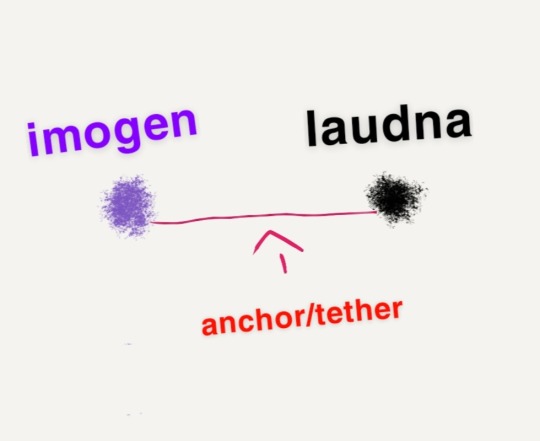
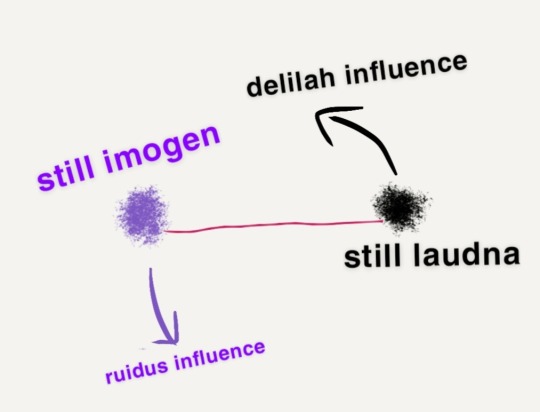
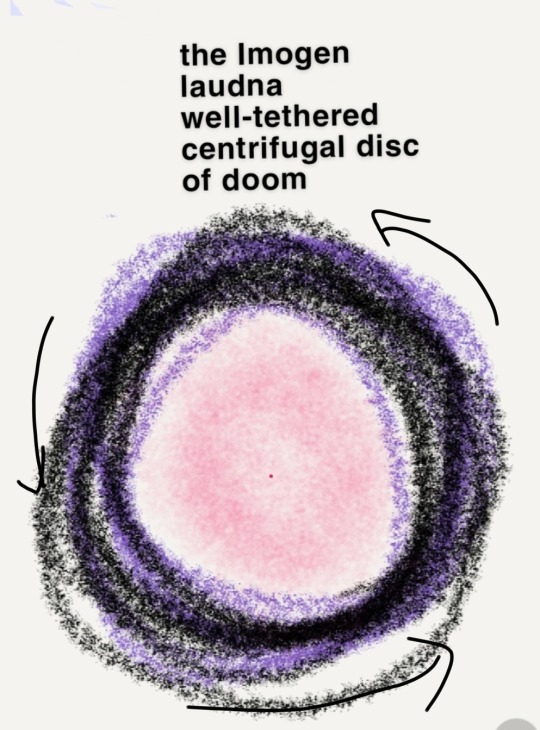
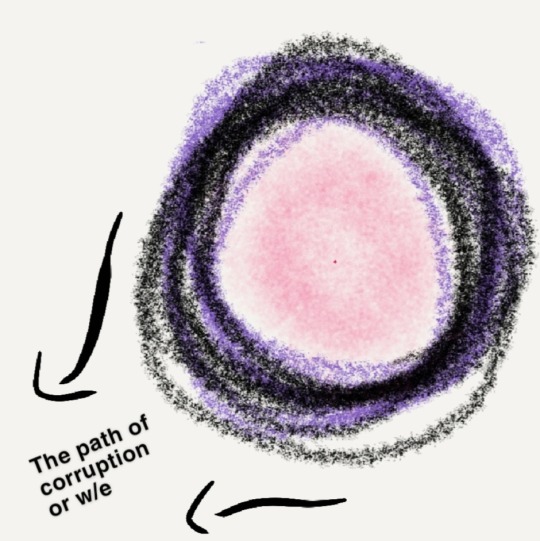
like. thanks. brain. i guess.
bonus thought that popped up when drawing this:
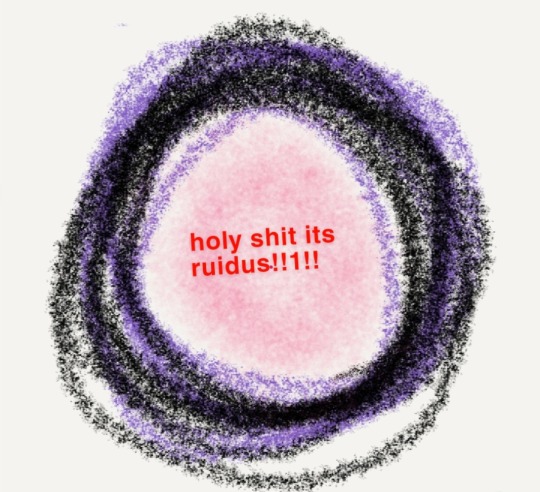
#critical role#imogen temult#laudna#c3e65#cr spoilers#kinda#sorcery pact#LOOK I CAN ABSOLUTELY WRITE MORE THOUGHTFUL IN DEPTH ANALYSIS OF THIS or i can illustrate this and giggle at it#orbs spin fast. hah.#:)#(once i watch. proper meta is coming. this is both a promise and a threat)#i was partway thru making this post when i lost signal for a while and had to ask someone around me whether centrifugal is the outward forc#and couldnt explain why i was asking#the sacrifices i make for cr......#shitpost#spar speaks#imodna#.....?
1K notes
·
View notes
Text
Even putting aside the Dorym of it all... I kinda feel like part of the reason Orym misses Dorian so much is that Dorian is kinda the next most normal person in the Crownkeepers and Bell’s Hells. Which is honestly a little wild to be saying about a runaway prince in disguise. But like...
The Crownkeepers have/had:
- A himbo dwarf Sorceror who has been singled out by a Lesser Idol in a fursuit.
- A bubbly girly-girl Warlock who is apparently her own patron (and the Spider Queen's here too, I guess)
- A Rabbit-folk Paladin who used to be a bartender in Fantasy Vegas and is now devoted to the goddess of death.
- A kleptomaniac Faun whose adoptive grandmother is an eldritch hag with the power to alter fate. Also, has a pet monkey that shits fire.
- Does Cyrus count? He’s an NPC. In any case, he’s basically the same as Dorian, but More Himbo and less useful, lol.
- A woman so intense she is literally always on fire.
Bell's Hells has/had:
- Fearne (I already explained her)
- A Werewolf who makes toys and hates Santa.
- A walking corpse who is haunted by the spirit of the necromancer who raised her from the dead. Also enjoys puppeting a dead rat.
- A purple-haired Psychic who gets her powers from an imprisoned eldritch moon monster.
- A Barbarian punk who is half Primordial Titan, half Beacon, all attitude. Also, they used to be an Aasimar before his cultist parents meddled with powers beyond mortal understanding.
- A chirpy, sentient Robot who is technically a therapist, but also really bad at it. Recently discovered religion and is real annoying about it.
- An 80 year-old man who is an erstwhile member of the legendary Vox Machina. Also, known liar and coward.
In contrast, you have Dorian (runaway prince) and Orym (just some guy).
I feel like they probably met each other for the first time and were both like, 'THANK THE GODS, SOMEONE WHO ISN'T TOTALLY BONKERS,' and just stuck to each other. Like two acquaintances at a party where they didn't know anyone else. 😂😂😂
#i hope you enjoy the silly things my brain makes me think about#critical role#critical role spoilers#cr spoilers#cr3e92#c3e92#cr3#exu#orym of the air ashari#dorian storm#bell's hells#crown keepers#cr meta#character analysis
150 notes
·
View notes
Text
To no one's surprise, I have more thoughts on Ashton's feelings about faith and begging for divine intervention and never receiving it, because... well, look at what's in their head.
I tend to take the view that the Luxon as a divine entity does not necessarily have conscious intent in granting divine favor; it is closer to a foundational force of reality, with the rather nebulous thought that might accompany a living entity associated with that kind of force. So not inert matter, but not exhibiting the will and motivated action that the Pantheon or even the Primordials do. The Primordials are closer, in that they are active, but I think they are less willful. This isn't particularly relevant to this discussion except as evidential comparison, though, so I digress.
What this view of the Luxon results in, in practice, is the bestowing of power by seemingly random chance. The beacons are where they are, and any movement of their worship or use is in the hands of mortals who convey that—whether that's the expansion of dunamantic arcana in Aeor and possibly the larger world in the Age of Arcanum, or the missionary efforts of the Kryn Dynasty, or simply one person passing it to someone with ill intent who exploits another worker to expand its use and turn it into a weapon instead.
And what happens is that these smaller exchanges create ripple effects, and the path of this force being conveyed continues, which is how it has come to Ashton—by a series of circumstances that, when looked at individually, look like mundane random chance, but taken as a whole, are so unlikely that they seem meaningful in the end.
I think this gets to the heart of what the Luxon seems to rule—the world may be governed by chance and circumstances, but when those circumstances are accumulated—into an event, or a nation, or a life—they create not destiny but meaning.
Ashton's circumstances are a series of misfortunes that feel almost fated in how perpetual they are—when he spells out the course of his life, and says that he can count on his fingers how many genuinely good days he's experienced, the weight of that misery feels like an oppressive fate.
But within the amalgamation of that misery, they've also happened upon—one might say were bestowed with—power. This is the power that lets him decide to be a hero and decide to save his friends. And, by some accounts in Exandria, it would've been granted to them by a god, without even asking anything in return. It's not verbal, so it's not a concession or meant to be placating, which wouldn't do much in the long run—it's the means by which Ashton has been able to wield control over his own destiny.
So if there's any meaning to circumstance, maybe it means that when Ashton prayed, something already answered.
#this just in: marble tomes office of export controls actually just the missionary arm of the kryn dynasty.#luxon blogging#critical role#cr meta#cr spoilers#ashton greymoore#me: meta doesn't have to be super polished or formal stop worrying so much about it#also me: if I don't explain my methodology for this analysis I'll fucking die.
431 notes
·
View notes
Text
Critical Role's Previous Cameraman
I put up a post the other day about critical role's new animated introduction and I couldn't help but notice a sudden spike in the analytical stuff that I don't really understand. A more tech orientated friend of mine informed me that this was a good thing, actually. So, I thought I might capitalise on that and examine the previous campaign's opening sequence through the same lens and do some more analysis.
Let me explain.
SPOILERS AHEAD

One notable thing about this song is when it starts. Exactly eleven seconds in. That's eleven seconds of wait before the final payoff. You catch glimpses of what's happening above, but nothing else.
And that is a key theme of this campaign. The unseen. The Mighty Nein was a party characterised by trauma, and a lot of the time, you don't see that, you only see glimpses. A flash of a fight they told you about, and the sensation of drowning.
But then we meet Fjord.
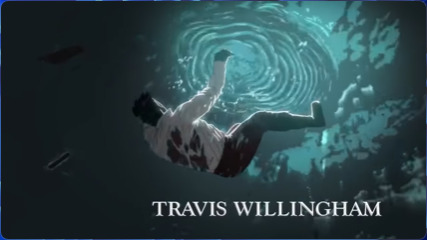
He's falling, and I'd like to point out the direction in which he is falling. You will notice the scars on his back, signifying he was probably in the process of running away, or was betrayed by someone, and he is falling towards those scars. Backwards. There is also a neat thing of falling away from the light, into the darkness, into the unknown. THis is someone out of control, leaning into the pain. And what is it that sees that?
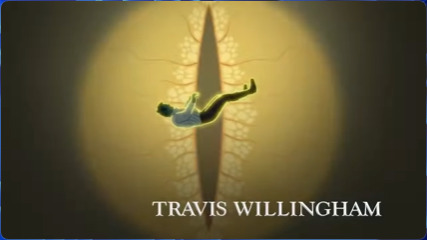
There is a reason Uk'otoa's design looks so much like a leach. The creature is a parasite, it doesn't find someone strong to break down, it found someone weak, and at its mercy, and brought him under its control. What this shot does is highlight that creature's opportunistic nature, but it also associates it very clearly with the visual of that eye.

And it's that eye that carries through. When Fjord washes up on the beach, when he is finally safe, he carries with him a little piece of Uk'otoa, a little piece of that trauma.
It's also notable of that it is an eye. It's obvious, but it colours his vision, and changes how he views the world. Its effects aren't physical, but mental.
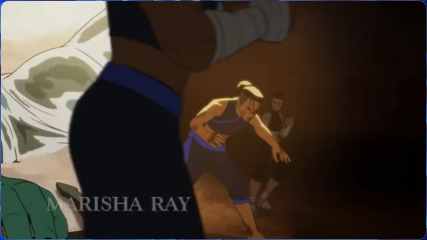
Beaureguard Lionet is a fighter. Not in the sense of class, because she isn't but in the sense of personality. Beau is a fighter in the sense that her first reaction to any problem is to punch it.
This transition is a wipe transition, but its important because of what it uses. It uses the opportunity to show off the uniforms of Beau's attackers, because otherwise the shadows of the rest of the shot make them hard to make out. These are wearing the same robes as her. Whoever they are, they are part of a team of some kind with her, they are people she should be able to trust, but look at how much damage they have done to her. Look at how heavily she is breathing. And look at what Beau does in response.

She fights back. This is how the animation gets across this character. She isn't complex, she doesn't need a great explanation, she doesn't have different sides to her, she just hits things until they stop being a problem.
I will also point out her eyes again. They are blue, not an unnatural eye colour, but they are the same blue as her robes, and the robes of those who are attacking her. Once again, the has warped the vision of its recipient, and in this case, it's creating a cycle of violence as all she knows how to do, is hit things.

We don't see Nott The Brave for a while in this animatic. We instead see, once again, the eyes. But I also want to point out that this was made before we knew about Veth. So we were just seeing the scared goblin.

This is as close as we get in this scene, and its Nott actively hiding from the light. The warmth scares her, and for good reason, its the same heat that we see emanating from her eyes. Once again, the trauma that has contaminated a character's vision is changing their reactions to the world.
And with that, I would like to talk about Jester, and I would like to do that in context.

The term "foil" in the context of a character was actually popularised by William Shakespear, who handily explained the metaphor for us.
"And like bright metal on a sullen ground,
My reformation, glitt'ring o'er my fault,
Shall show more goodly and attract more eyes
Than that which hath no foil to set it off."
Put in English, I shine brighter when you have something to compare me to. And this is what a foil character is, a character who brings about elements in other characters that can easily be missed, or who shows off by contrast their personalities.
Jester is one of the two characters in the Mighty Nein who is not a child of trauma, and her introduction shows that. She reacts to her life by laughing, and contrast that with everyone else. Fjord reaches for a sword, the item of his trauma; Beau tries to fight her trauma despite that approach clearly not working; and Nott hides from it, unable to reach out for help.
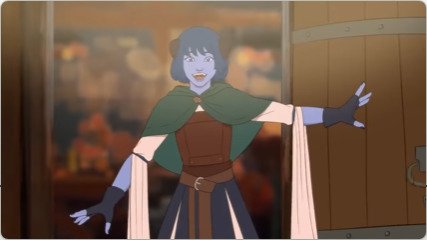
And it is notable that the first time we see an adult Jester, she looks normal (if a bit over cheerful), then is immediately contrasted with the rest of the Nein.
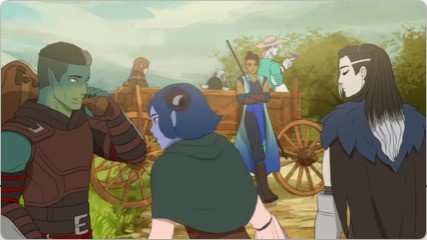
This not only shows just how different her demeanour is from the rest of the crew, but it shows her effect on them. She makes them all smile. Jester and Caduceus are very much support characters in the truest sense of the word. They support others. Jester shows genuine kindness towards everybody else, and it reflects onto them.

This shot is neat but not too special. Its a tracking shot on the hat of all things, because thats what important here, and it shows the traveling dynamic of the group. It's a tiny bit of tension in an otherwise calm scene, so the camera is steady, but speeds up slightly to match the movement of the object, then comes to a stop when it is caught. There is very little stress, but there is a sense of comradery.

Similarly, this shot establishes some stakes with a rising pan to show the scale of the threat and to show some more information, but it is hardly a monster, so the camera isn't really in a hurry.

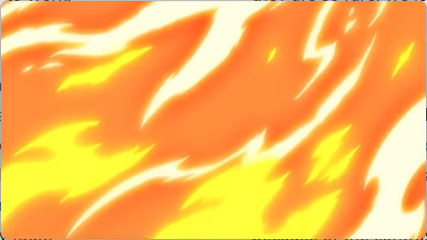
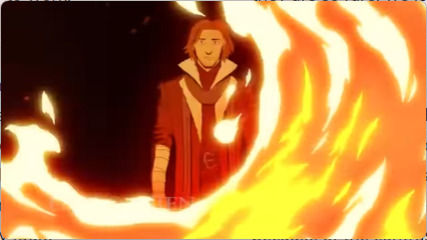
Enter Caleb Widogast, born in fire. I don't think they could write a more thematic entrance if they tried. An abrupt cut shows the night, then it is entirely consumed by fire, only to reveal Caleb.
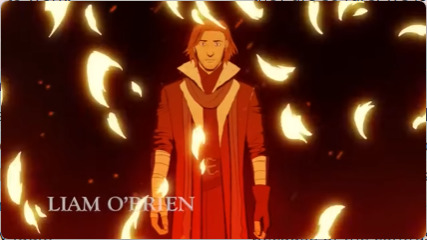
There is no motion here. The camera is stock still. This is the exact same thing with Ashton and FCG in the Bell's Hells. Caleb is disassociating from the heat in front of him, and there is a fascinating reason behind that. Caleb has two characters that need to be introduced to better understand him, the man, and Bren, the boy.
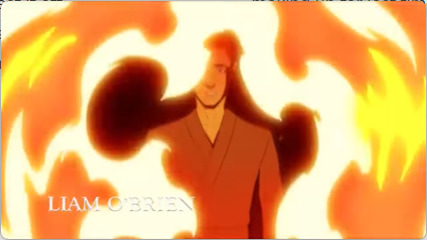
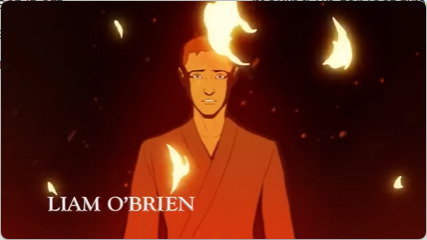
The flames consume the screen again, and then part to show a boy, staring at the screen, in horror. This is what you need to know about this character, this is a character forged in flames, born from the Ashes. Bren is dead, Caleb Widogast remains.

And this shot, with Caleb, Astrid and Eadwulf silhouetted against the fire, shows what kind of trauma we are talking about, and what effect it has. This is guilt, and in contrast with the rest of his party, this guilt is paralysing.
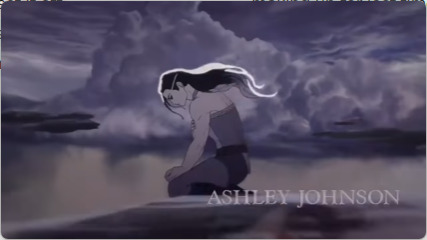
Yasha, however, is introduced in a calm way, in contrast to everything around her. The camera shows you a woman, meditating, and then pans backwards to reveal this:
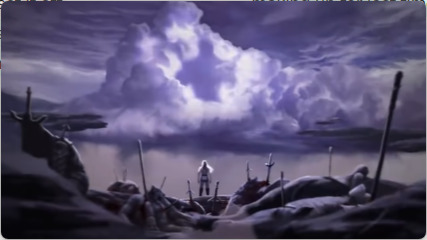
This is a woman surrounded by bloodshed, who has made a concerted effort to look away from it, and to look to the Storm Lord for guidance. This is a woman looking for healing, in comparison to everyone else, but that looking doesn't change the fact that that trauma is still there.
The next few scenes are cool, but don't really add anything to this analysis and I only have a few more images I can show here, so I'm going to skip to Taliesin's characters.
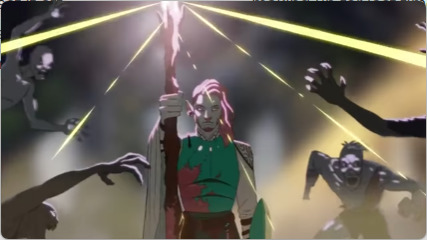
Caduceus has two introductions. One is this shot, which is a cool action shot of him casting an epic spell and vanquishing a crowd of enemies. But instead of the incredibly animated (in the sense of exaggerated poses) nature of his companions, Caduceus clay is calm and collected. He is unquestionably the anchor of the group, and where Jester contrasts them emotionally, Caduceus does so on a philosophical level. Caduceus is a gardener of fungus.

Mushrooms and other fungi are recyclers, they grow on dead trees and creatures and give a forest new life. They clear out the debris and make way for new things to take hold. That's what Caduceus does for the Nein, he helps them get through their trauma so that Jester can help them improve and become better.
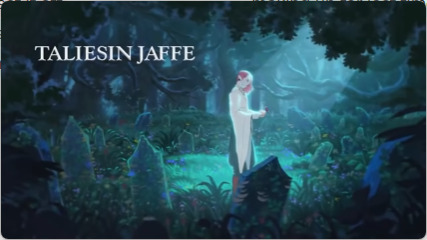
Caduceus's actual introduction is muted, and there's a point to that. He's not trying to be the main character, you don't need to understand his family life to understand him. You need to understand that can stand in a graveyard and see the light, that he is at peace with what has gone before him and helps people to get past it, and that his entire mission, to regrow the grove, isn't to bring back what is lost, but to help regrow something new in its place instead of the blight that lingers there.
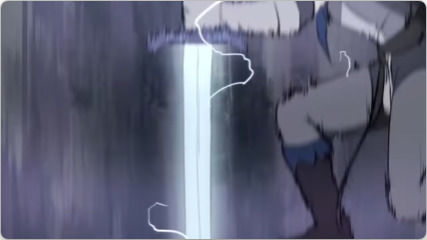
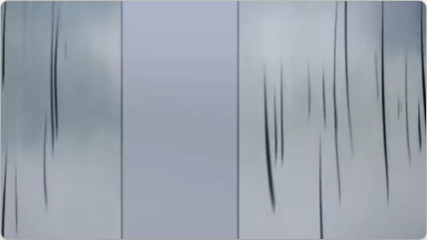
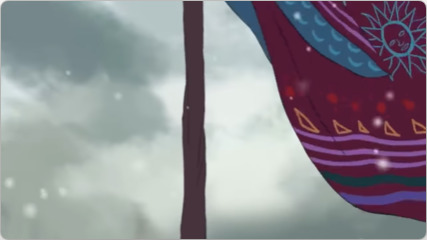
Mollymauk is introduced as a weapon transformed into a grave. That is what this transition is and I think that's really important. Mollymauk is, very clearly, a repurposed soul. He isn't the first person to inhabit that shell, and he isn't the last. I also want to point out how this character is represented here, not with a heroic memory, but with a quiet moment or remenicing on times gone by. He is a shadow that haunts the Nein.

This is by far the simplest shot in the entire video, and that's because it isn't telling you anything. You bring your own emotions to the table here, you bring the memories to the grave, that's how grieving works.
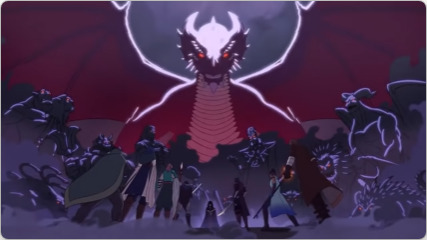
Once again, there is more to this video, but I'm only allowed to put 30 images in a single post. So I leave you with a quote from Niel Gaiman.
"Fairy tales are more than true: not because they tell us that dragons exist, but because they tell us that dragons can be beaten."
DnD likewise, and all TTRPGs for that matter, are powerful because in them, with a little bit of help from friends, any monster, no matter how personal, can be defeated.
#rants#literary analysis#character analysis#literature analysis#what's so special about...?#critical role#critical role campaign 2#the mighty nein#mighty nein#caduceus clay#cr caduceus#fjord stone#fjord cr#beauregard lionett#cr beauregard#nott the brave#cr nott the brave#veth brenatto#veth the brave#mollymauk#yasha#caduceus#beauregard#nott#jester lavorre#beau#jester critical role#caleb widogast#caleb critical role#yasha nydoorin
177 notes
·
View notes
Text
You know what's interesting to me? For all people keep claiming at every juncture that perhaps Bells Hells will come around on the gods and see the harm they do (which, as discussed extensively, is, half the time, simply not intervening) not only have they never done so, but also they never quite cross the line into saying the party should join the Ruby Vanguard or aid them - and indeed, they defend against it - so what does this achieve? It feels like they're asking for a story in which the party stands idly by, which isn't much of a story nor, if I may connect this briefly to the real world, a political stance anyone should be proud of.
That's honestly the frustration with the gods and the "what if the Vanguard has a point" conversations in-game. What do we do then? Do we allow the organization that will murder anyone for pretty much any reason that loosely ties into their goals run rampant? The group that (perhaps unwittingly, but then again, Otohan's blades had that poison) disrupted magic world-wide, and caused people who had the misfortune to live at nexus points to be teleported (most, as commoners, without means of return). While also fomenting worldwide unrest?
Those were the arguments before the trip to Ruidus; with the reveal of the Vanguard's goals to invade Exandria, the situation becomes even more dire. Do you let the Imperium take over the planet?
And do the arguments against the gods even hold up? If Ludinus is so angry at them for the Calamity, what does it say that he destroyed Western Wildemount's first post-Calamity society for entirely selfish means? (What does it say about the validity of vengeance as a motivator?) What does it say that Laudna told Imogen she could always just live in a cottage quietly without issue before the solstice even happened? (Would this still be true if the Imperium controls the world?) What does it say that when faced with a furious, grieving party and the daughter she keeps telling herself was her reason for all of this, Liliana can't provide an answer to the question of what the gods have done other than that their followers will retaliate...for, you know, the Vanguard's endless list of murders. (That is how the Vanguard and Imperium tend to think, huh? "How dare your face get in the way of my boot; how dare you hit me back when I strike you.") She can't even provide a positive answer - why is Predathos better - other than "I feel it", even though Imogen and Fearne know firsthand that Predathos can provide artificial feelings of elation. Given all the harm Ludinus has done in pursuit, why isn't the conclusion "the gods should have crashed Aeor in such a way that the tech was unrecoverable?"
Even as early as the first real discussion on what the party should do, the fandom always stopped short of saying "no, Imogen's right, they should join up with the people who killed half the party," it was always "no, she didn't really mean it, she just was trying to connect with her mother." Well, she's connected with her mother, and at this point the party doesn't even care about the gods particularly (their only divinely-connected party member having died to prevent the Vanguard from killing all of them). So they will stop the Vanguard; as Ashton says, the means are unforgiveable. As Laudna says, it's not safe to bet on Predathos's apathy. As Imogen says, she's done running; the voice that she used to think of as a lifeline belongs to someone she doesn't trust. So I guess my question is: if they're stopping the people who are trying to kill the gods (and defense of the gods isn't remotely their personal motivation)...do you think the next phase of the campaign is Bells Hells personally killing the gods? Reconstructing the Aeor tech and hoping none of their allies notice? How does this end? Does your ideology ever get enacted? Or is this entirely moot and pointless and the story ends with Bells Hells saying "well, I'm really glad we stopped the people who [insert list of Vanguard atrocities from above]; none of us follow the gods or plan to, but honestly, the status quo we return to is preferable to whatever nightmare Ludinus had concocted in his violent quest for power and revenge"?
#i've got a lot to do today so I think I'm done posting but#cr spoilers#i called that this particular cohort of fans had empathy only for those like them and were terrified of player agency like. 18 mos ago#and i have never been proven wrong. zero analysis just a constant demand that everyone coddle their feelings and confirm their biases#literally will straight up fabricate lore and cry you're disrespecting a pretend person for not including it in your considerations#absolutely SHIT understanding of actual lore. utter incapacity to follow a logical throughline to its conclusion#it's like. wow. wonder why you're so focused on hypocrisy and you overreact to the word selfish#the reason they hate or fear orym (they say they don't...but that just means they want him to go to a reeducation camp instead of die)#is bc i think they are truly terrified of the idea that people can not just hold opinions that are against theirs but stand fast by them#easier to stan the villain because then they die and you can feel wronged and betrayed and wallow in a sense of continual victimhood#than to like a character who might last long enough to call you the idiot and asshole that you are#but it's also funny bc literally if orym weren't there in the latest convo the conclusion is the same.#ashton's had the same opinion of the vanguard the whole time (and it's not positive) but that's not under scrutiny#probably bc it doesn't allow people to be ghoulish in the most cringeworthy way possible
107 notes
·
View notes
Text
Yesterday, I was talking with a couple of friends about the newest Dimension 20 episode and it was brought up how killer a party the bad kids are. Their levels of optimization and total mastery of the battlefield is a sight to behold. From there, it was mentioned how Bells Hells and the Bad Kids are at the same level (level 13). And naturally, we began to compare the two parties, and it became quickly apparent that one party felt leagues ahead of the other. And that got me thinking, what do the Bad Kids have that Bells Hells don't?
And this is nothing about the players themselves. All 13 players from both CR and D20 are masters of what they do. Their level of strategy and creativity is unparalleled. And you can't say that one group of people is specifically better than the other. So then where are these problems coming from? And then I realized the problems didn’t have anything to do with the players. Not with characters or even their choices
It’s their party composition that’s the real issue.
While on the surface, BHs looks like a very diverse party, everyone in it is very locked into specific roles. We have three melee fighters (who can really only act as melee fighters), two spell casters who mostly have damaging spells (mixed in with some support stuff) and a cleric (that is really locked into their role of healing and support). Fearne is really the only character with any real versatility but because of the current party setup, she kind of has to play support or healing, otherwise the party becomes very unbalanced.
Because so many characters are unable to deviate from their “roles,” everything becomes much harder.
Look at the bad kids in comparison, Adaine can quickly switch from pure damage dealing to support moves very quickly, Fig can switch between melee to spells to straight up healing, and Fabian, who is mostly melee, is still able to take on a support role because of his levels in bard. And while they do have some more rigid roles (Kristen, Gorgug, Riz), these characters still have options via spells.
The best DND parties are the ones where the individual roles are fluid and ever changing. And because BHs setup, that becomes a difficult feat to pull off.
And then I was thinking about why.
Why they would design the party this way if it was so clearly unsteady.
But the thing is, it wasn’t supposed to be.
Because there is one word that explains exactly why the party is what is. One word that simultaneously explains and fixes everything.
One word.
Dorian.
Having a bard in the party would go miles into helping BHs and make a lot of those issues outright disappear. Dorian ,as a Swords bard, can engage in direct melee, but can also provide additional support and be another source of healing within the party. Spells like Hypnotic Pattern, Warding Wind, and Shatter are all incredibly useful within combat, and having caster that can take a hit is always a good thing.
And again, do I think that Bells Hells doing something wrong by having the party they have? Absolutely not. Despite my earlier statements, I'm genuinely impressed by their accomplishments, strategy and overall creativity. I love them all. But having a Bard in the party wouldn't hurt.
TLDR; Dorian we need you.
#critical role#dimension 20#bells hells#the bad kids#critical role spoilers#d20#cr#fantasy high#fantasy high junior year#fhjr#bad kids#dorian storm#no hate to either#i love both cr and d20 alot#analysis#your free to disagree just don't be a dick about it#cr spoilers#i really want dorian to come back if yall couldn't tell
52 notes
·
View notes
Text
the thing is, like, imogen is blunt, and indecisive, and impulsive. she's cynical, angry at the world, and seemingly much less interested in doing good than in holding on to her loved ones. she's hypocritical, incredibly violent one moment and horrified at the prospect the next. she's passive aggressive, on occasion. she's overly critical. she's scatterbrained.
and all of that stuff is very fucking fascinating, and so fun to watch, and core to what makes her her. but not only are those things not the totality of imogen as a character, they're very much inextricable from the things that make her sympathetic.
imogen has spent much of the last decade of her life in pain, and isolated because of it. when she wasn't alone she couldn't relax, having to keep tight control over her mind so as to not get overwhelmed or invade the privacy of others. because even through all that pain and loneliness, she still bore the responsibility not to impose on other people's minds. and when she fails or slips up or gives in, all of the distrust and suspicion she recieves regardless is suddenly viewed as justified.
which is not to say imogen is not responsible for her actions, or the harm she causes others. of course she is! no one is saying she isn't! but, just like literally every other person, her actions don't exist in a void but within the context of both her past and present.
analyzing that context and coming up with explanations of her behavior that consider it is not excusing her actions or refusing to acknowledge her flaws. it is not coddling imogen to sympathize with her even when she's fucking up. these are pretty standard ways to discuss a character you enjoy actually! it's weird that having a nuanced perspective on a character's actions is being treated as an issue!
#imogen temult#critical role#cr#i mean. to get into it a little bit. one benefit of this approach to character analysis is that it often gives you takes that feel#much truer to the text than “imogen speaks into people's heads to manipulate them and she was the one who abandoned her dad” which. how#to get into it even more its so fun that the “not being hypercritical of imogen is sexist actually” discourse is happening mere days after#the “anyone questioning orym's decisions clearly hates him and liam and also conflict and flawed characters in general” discouse. lol#if laura had given a monologue announcing “imogen has seen the cycle of harm and is choosing to perpetuate it” i wld talk abt that too. btw#were i without a massive headache i would devote more attention to anticipating and responding to counterarguments#but we're just gonna have to take the “if you get it you get it” route on this and release this post like a wild animal into a crowded room#ok bye. actually i have an imodna specific followup but then bye.#long post /#CRposting
163 notes
·
View notes
Text
I've been building up this post for quite a while so I think everything in this post is kinda out of order and looks like a bit of a big word vomit... So sorry in advance. Also since it is kinda longer than I realise, I am putting it under the cut. And I am open to any discussion.
(Personally think I may have gotten a few things wrong and if so, please correct me?)
I think the thing about Orym and grief is... A part of him has never let himself grieve his loss properly. He has accepted that they are dead and will never come back, yes. He makes it a point to live up to them everyday, yes. But acceptance is not the same as grief, it is a part of it but not the same.
And this was an interesting discussion I was having with my friends and I feel that it strikes so true here, is the fact that you remember the worst moments of your life more vividly than the happiest moments because in your happy moments, you don't question what happened to you as much as you question your worst moments in life.
And Orym has lived with that question for six years. Now, the same could be said to Ashton and Imogen and Fearne and the rest of the Bells Hells really but as pointed out in this post by @caeslxys. (a really good pot btw) Even though the others have had their questions as to why a particular bad incident happened, Orym has had the shortest time to actually cope with it while for the others, it has been years at this point and maybe they have sort of come to peace with most of their shit before it came back to hit them in their face. And for some, it just hit them recently.
And for Orym the question of "Why?" resurfaces again and again the more he seeks out answers and when he does get the answer... I don't think anyone would really love to learn that the two most important people in their lives were dead because "it was just collateral damage. They didn't really have to die but they did." Not when you were having a happy, peaceful life. They signed up for this, yes. But it is also not fair to have your whole life cut short just because a big shot wants to test a theory.
And I am not trying to say that Orym bringing up his losses every time they have a discussion about the Vanguard is right or wrong because he has every right to and may be wrong at the same time because he is biased. Because at this point, he is very biased.
Apart from what I mentioned above, Orym watched Otohan kill his husband and father. He fought Otohan again and this time lost his life, Fearne and Laudna. He fights Otohan again and nearly loses Keyleth. Fights Otohan again a fourth time and knows that there would've been more losses if FCG hadn't sacrificed themselves. Not to forget Otohan killing Eshteross, something I think Orym internally blames himself for because she read his mind for the information. And even if Otohan is now dead, the loss stays.
I also think that seeing Will when he died had more of a personal impact than he realised because I know while seeing the dead person can sometimes bring some comfort, at the same time, when you are trying to live up to them, trying to answer questions that are just beyond you when you really haven't had the chance to completely grieve and accept, the grief possibly just hits you more.
SO while the Hells have had their personal losses with the Vanguard and Otohan, I think Orym has had the longest beef with the group among them all. He didn't know about the Vanguard 6 years ago, yes. He discovered their name along with the rest of the Hells. But loss wise, Orym was the first of the lot to suffer due to the Vanguard.
This is not me trying to put an exact scale or measurement of the loss cuz it is intangible and stuff. But he's been dealing with it for 6 years. Maybe not for harbouring revenge, but the resentment hasn't completely gone but rather festered the more he seeked answers. So he is going to be extra jaded.
But not to forget the fact that up until Bordor, he did try to see the Vanguard's point too, still kinda does (the locket he took from a Vanguard member as a reminder) but I think by the time of Bordor's betrayal, he's had too many losses with the Vanguard to actually care of their point of view because all he's seen of their group is innocent people getting killed or almost killed for no reason at all.
Bordor's beef as a person from the Vanguard had been against Laudna, Orym and Ashton but he still nearly killed Prism and would've probably marked it off as collateral if she'd died. Dropping off the locket with Bordor doesn't mean that he left all his empathy but at the same time, like he mentions, they are at war. And war doesn't really discriminate amongst people. It just takes.
Like he said to Imogen, I think he still tries to believe the Vanguard can have some people who are good and not all of them are evil but all he's know from the Vanguard at this point is loss and Liliana's blind faith towards Ludinus or Predathos doesn't help.
So back to the recent episode.
Do I think that it is wrong for Orym to bring up to Liliana about his dead family as an answer to her response. No. Do I think it was a wrong time to bring it up? Maybe. Because Liliana was not being confrontational but Orym was turning confrontational the more the discussion happened.
But the thing about Orym saying it to her face is that... It is one thing to know that there have been deaths and even if Liliana didn't directly cause it, she was a part of the group that did and brush it off as collateral damage. And no one does a census or survey post the "collateral damage" on how it affects the other person because now, they have what they want to there is no use to go back there.
And Orym is kinda like that mirror which is like... "SO you had a loss because of the gods and now are going around leaving collateral damage you want to fix stuff? Guess what? Your collateral damage was my life that you just uprooted just like the gods/god people did yours, so are you really any different from the people you hate and the change you want to bring about?" (which is kinda the parallel between Orym and Bordor I find really interesting because this is a cycle that is never ending at the end of the day)
And did Orym need that outlet? Hells yeah. GIVE THAT MAN A HUG!
#long post#critical role#critical role spoilers#orym of the air ashari#the downsides of being a psych student#you analyse the shit out of stuff#at least I do#messy thots#cr speculation#orym needs a hug#Also have 3 continuous exams so if I am going to edit (and later on hate on how I have worded this post...) it will be after 3 days.#character analysis
46 notes
·
View notes
Text
"Obviously I care for you an immense deal..."
Now that imodna is sailing more towards a romantic relationship instead of a (queer)platonic one, this sentence has been on my brain since the episode aired.
Because while Laudna said that, you saw everyone around the table hold their breath, because it sounds like the start of a rejection. but it's not. and this is such a beautiful (perhaps unintentional) representation of aromantic and/or asexual love. As in, our love and the way we love and express that love get misinterpreted sometimes.
"Obviously I care for you an immense deal", was not a rejection and that much becomes clear when Laudna continues. But the sentence itself was never "I care for you but not like that". It's a: "I care for you an immense deal, and I'm not even sure how to define that care and love for you. But I do. So, so damn deeply...!"
Of course, Laudna loves Imogen. She has stated so many episodes already. ("It transcends words, our relationship" <- literally doesn't know how to describe her feelings for Imogen, they're that strong!!). But since she hasn't "accessed that part of her brain" in decades, it's going to take some time to get used to certain expressions of love that haven't been on her mind in so long (if ever at all?).
And so far, Laudna does seem open to those expressions! Her stunned but enthusiastic "alright" is a great example of that. Like "Oh. Yeah! I hadn't really thought about kissing you, but now that you mention it? Yes. Sounds lovely! Let's do it."
i don't have a crystal ball or anything but I can totally see a very similar approach to Laudna as we saw with Keyleth (who is canonically demisexual). To me Laudna is definitely somewhere on the aro/ace spectrum who is comfortable being in a (romantic) relationship with her partner. She doesn't mind sharing kisses, if only because it's a way to be close to Imogen, and doesn't shy away from intimacy.
"Obviously I care for you an immense deal..." right after their first kiss. It's like Laudna is saying:
"Love is weird, but loving you is not."
#critical role#imodna#laudna#asexuality#i had to resist the urge to write a 10k dissertation#cr#i love a good analysis
156 notes
·
View notes
Text
There is something so interesting about Orym having an idea that Laudna killing Bor'dor could bring Delilah back when you look at it in comparison to his character in EXU.
EXU Orym threatened Dorian because of the chance that, if things went sour, Dorian might put on the crown and get involved with this betrayer god. He saw the effects it was having on his friend and thought 'you will throw yourself on the fire to keep us warm and I need to step in to stop that'.
Current Orym sees his friend drawing on dark magics, the powers of a woman who has tormented her for years, who she fears, and when she herself is slipping to such a dark place and ready to kill someone, he nods. 'This is war' he says. 'We may need this' he thinks.
Because the first time he dealt with the Ruby Vaguard, they killed his father and husband. The second time they killed him, Fearne and Laudna. The last time they faced them, they succeeded in their plan to help bring the end of the gods and nearly killed his leader. I imagine he isn't feeling too optimistic about the next confrontation. Hes exhausted and probably scared and so when he hears that this guy is lying to them, that he is with the people who has done this to them, Bor'dor has to die. He is a threat and needs to be dealt with. He is a very different person to who he was at the start of this journey.
Laudna, already in a dark place after everything, now betrayed once again, possibly taps into Delilah knowing the conseqences but goes for it anyways. Who knows if she even could have been stopped. But she acts first and there is no one there to draw a sword and tell her to put the crown down.
#i will write a meta about laudna later but i was thinking about exu again after they talked about it on 4sd#i thought imogen would be the dorian parallel but its laudna instead#and its not 1:1 i know#critical role#cr spoilers#cr3#orym#orym of the air ashari#if anyone has an issue with my wording or analysis please feel free to discuss in the replies#i dont wanna see any vague posts in the tags about this#thanks
149 notes
·
View notes
Text
Not only is Lilliana full of shit... I think (at least subconsciously) she knows she's full of shit.
Here's thing #1. She claimed in the most recent episode (C3 E92) that she didn't become aware of the heinous crimes committed by the Ruby Vanguard until recently.
If she only just learned that Ludinus' plans involve doing some seriously evil shit... then why would she insist that she's the only one capable of curbing his worst impulses?
Really, Lilliana? If you know Ludinus is doing bad things, and he would do worse things if you weren't around to reign him in, you can't claim ignorance as an excuse for your involvement in his plans.
#2. If you don’t think Predathos is dangerous to mortals, why would you have spent the last 10 years in Imogen's dreams telling her to run away? Why would you be so afraid for Imogen the first time you noticed her attempting to commune with Predathos directly?
I guess it could be argued that communing with Predathos could draw Imogen further into what Ludinus is doing. But even then... if Predathos is really the one in charge, and is just manipulating Ludinus, why not just ask Predathos directly not to involve Imogen in its plans? Does Predathos not care about harming its Ruidusborn children? Do you think Predathos would lie to you, even though you claim to know exactly what it does and doesn't want?
Lilliana KNOWS that the Ruby Vanguard are committing enormous harm to normal people. She KNOWS that Predathos is dangerous to mortals.
As Lilliana herself has said... she's in too deep to back out now. Or at least, that's what she believes. She's spent AT LEAST 10 years (probably longer) following Ludinus and fighting for his cause. She gave up her life with her husband and daughter to pursue this. If she leaves now, all that time and work and pain will have been wasted.
Not only that, but the idea that this mission she's given up her whole life to pursue might be a lie? Lilliana has made this cause her entire life and identity. Imogen and her friends aren't just challenging the plan. They're challenging everything that makes Lilliana who she is as a person. If her cause is a lie, Lilliana herself is a lie.
Plus, the thought that the plan she's been fighting for has already done immense, irreparable harm to thousands of people across Exandria AND Ruidus... and threatens to do even more damage still? It's unbearable. She thought the cause she's devoted her life to and sacrificed so much for was just and beneficial. Now that she's being challenged by someone she loves (her daughter) with undeniable evidence to disprove that idea, she's trying to double down. She can't process the thought that not only is she the villain in someone else's story... they would actually be right to think of her that way.
All this is to say: I think a big part of why Lilliana is such a frustrating, infuriating character... is that she's actually a pretty realistic depiction of a member of an extremist cult. The problem is that deprogramming from those patterns of thought and behavior takes a long, long time. Time that Bell’s Hells may not be able to give her.
(All the negative feelings about Lilliana are, of course, valid. She also makes me Big Mad, lol, especially after the latest episode. That said, she's also a very interesting and compelling character... based on all the meta I've seen written about her since last night, anyway. Good job, Matt Mercer! 😂)
#lilliana makes me so mad#but also i'm chewing on her like a piece of gum#critical role#critical role spoilers#cr spoilers#cr3e92#c3e92#cr3#lilliana temult#cr meta#meta#character analysis#long post
58 notes
·
View notes
Text
I don't understand how some folks, both people who like and don't like shadowgast, seem to still want me to believe that Liam "caved" to Caleb and Essek being in a relationship because of fandom pressure and continues to go along with it halfheartedly only because of that even though he secretly hates it.
And meanwhile we have entirely unprompted asides like "Imagine two wizards—" "I do. Often."
#I've seen both of these takes REPEATEDLY. RECENTLY.#like you do not have to like it nor do you have to even like how it is established in canon but ???#just like..... admit THAT instead?#tbh people put a lot of words into cast members' mouths#but frankly especially weird to say about a player who has pointedly discussed not taking fandom opinion into account#like. it's all 'well they play their characters how they want!' when someone's talking story analysis until it's a ship someone's mad at.#also 'matt doesn't really like essek either' is even wilder cuz like#did everyone else watch a different version of the show in which they were fighting over that one essek shirt lmfao.#ANYWAY pls know that every time liam is funny about sg or essek I do think about the fact that this opinion STILL exists.#and those thoughts are spiteful and vindictive.#cr discourse#ig
158 notes
·
View notes
Text
The Wisdom of Caduceus Clay
Caduceus Clay is a firbolg character in Critical Role campaign two and is one of the wisest characters I have seen in a while.
He is known for offering some simple advice in times of stress, to hero and villain, and its two of these pieces of advice I would like to analyse.
MAJOUR SPOILERS AHEAD FOR CRITICAL ROLE CAMPAIGN 2
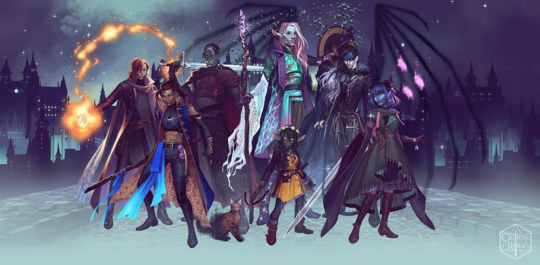
Ok, I know why you are reading this, and I know which speech you are thinking of. I will get there, don't worry, but first:
"Have you ever planted a tree before? Or a plant? Have you ever planted anything? Put anything in the ground?"

At face value, this is a speech about a garden. Caduceus is talking about green beans. But the metaphor here is, in my opinion, really cool.
"It doesn't know its purpose, but its moving to green beans."
Caduceus is talking about fate, and his interpretation of it is quite interesting. Fate exists, but it's pointless to chase it or run from it because you can never understand what it is. If someone tells you that you are fated to do something, maybe they're right, maybe not. You'll find out. Your fate is whatever you happen to do, in the end.
"The tree doesn’t know what it’s going to fruit."
Taliesin Jaffe (who played Caduceus) has since said that, when you think about it, Caduceus is calling out the story. This is a speech about playing D&D. You don't know how it's going to turn out, but life happens. Sometimes a story doesn't continue, sometimes it fails, but it was planted for a purpose, you only find that out later.

"And you, what are you?"
"Vegetarian, so I hope the meal reflects that."
So, Dinner with the Devil.
This speech is iconic. If you have made it this far in Critical Role, you have the final line burned into your brain. Here is Trent Ikithon, the villain of this story, being defeated not with a great flash of violence, but quietly and elegantly.
"Pain doesn't make people, it's love that makes people. The pain is inconsequential. It's love that saves them."
This here, is the thesis of the entire campaign. Forget the insults that sandwich it, this is incredible.
This is why Trent takes issue with the Nien on a personal level. These people represent the opposite of what he stands for. They are his antithesis.
This is even backed up by the plot of the entire story. The Nein are more focused on getting Mollymawk back than defeating Trent, he has become something they moved past. In the end, their story is defined by love, not trauma.
#rants#character analysis#literature analysis#critical role#mighty nein#literary analysis#what's so special about...?#life advice#caduceus clay#cr caduceus#the mighty nein
96 notes
·
View notes
Text
i know marisha's little "ashton if anything happens to her i'll kill you" and especially the "ashton abducted imogen" moments were at least partially for laughs but i like to think that laudna feels a kinship with ashton and they're the one person she'd most trust to look after imogen and keep her safe but also the person she'd most expect to snap and run away with her cuz like. she just had a moment where she snapped and who wouldn't wanna run away with imogen.
#cr spoilers#imodna#ashton#laudna#imogen temult#bells hells#this is not really serious character analysis just a little thought that i like :)
127 notes
·
View notes